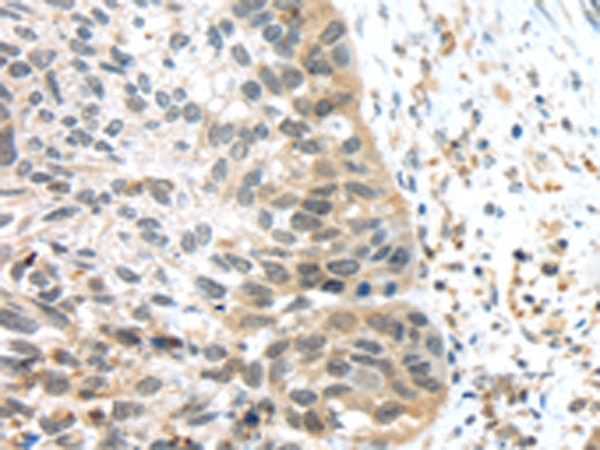
| WB | 咨询技术 | Human,Mouse,Rat |
| IF | 咨询技术 | Human,Mouse,Rat |
| IHC | 1/30-1/150 | Human,Mouse,Rat |
| ICC | 技术咨询 | Human,Mouse,Rat |
| FCM | 咨询技术 | Human,Mouse,Rat |
| Elisa | 1/2000-1/10000 | Human,Mouse,Rat |
| Aliases | CT78; TSPY; DYS14; pJA923/CT78 |
| Host/Isotype | Rabbit IgG |
| Antibody Type | Primary antibody |
| Storage | Store at 4°C short term. Aliquot and store at -20°C long term. Avoid freeze/thaw cycles. |
| Species Reactivity | Human |
| Immunogen | Synthetic peptide of human TSPY1/TSPY3 |
| Formulation | Purified antibody in PBS with 0.05% sodium azide and 50% glycerol. |
+ +
以下是关于TSPY1/TSPY3抗体的3篇参考文献概览:
---
1. **文献名称**:*TSPY as a genetic and epigenetic biomarker for prostate cancer*
**作者**:Lau YF, et al.
**摘要**:探讨TSPY1蛋白在男性生殖系统肿瘤(如前列腺癌)中的特异性表达,开发其单克隆抗体用于免疫组化检测,证明其在癌症早期诊断和预后评估中的潜力。
2. **文献名称**:*Antibody-based detection of TSPY variants in testicular germ cell tumors*
**作者**:Kersemaekers AM, et al.
**摘要**:通过定制抗TSPY1和TSPY3的多克隆抗体,分析其在生殖细胞肿瘤中的差异表达,发现TSPY1在精原细胞瘤中高表达,而TSPY3可能与特定亚型肿瘤进展相关。
3. **文献名称**:*Comparative analysis of TSPY gene family and antibody cross-reactivity across species*
**作者**:Vogel T, et al.
**摘要**:研究TSPY家族(包括TSPY1/TSPY3)在不同哺乳动物中的保守性,验证抗体在人类和小鼠模型中的交叉反应性,为跨物种生殖生物学研究提供工具支持。
---
**备注**:TSPY3相关研究较少,部分文献可能侧重TSPY1或未明确区分亚型。建议结合具体需求进一步筛选。
The TSPY1 (Testis-Specific Protein Y-encoded 1) and TSPY3 antibodies are tools used to study proteins encoded by the TSPY gene family, located on the Y chromosome. TSPY genes are primarily expressed in the testis and play roles in spermatogenesis and germ cell development. TSPY1. the most characterized member, is implicated in male-specific cancers, including germ cell tumors and prostate cancer, due to its potential oncogenic properties. TSPY3. a less studied homolog, shares structural similarities with TSPY1 but has distinct expression patterns and functional roles that remain under investigation.
Antibodies targeting TSPY1/TSPY3 are critical for detecting protein expression in tissues, enabling research into their physiological and pathological functions. They are utilized in techniques like immunohistochemistry, Western blotting, and immunofluorescence to map protein localization in normal and cancerous tissues. Specificity is a key consideration, as the high sequence homology among TSPY family members may lead to cross-reactivity. These antibodies have also been explored as diagnostic markers for male-specific cancers or tools to study genetic disorders linked to Y chromosome anomalies.
Despite their utility, challenges persist, including limited commercial availability and variability in antibody performance across experimental conditions. Ongoing research aims to clarify TSPY3's distinct biological roles and validate clinical applications for these antibodies in oncology and reproductive health.
×